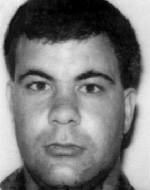Son of Hassna and Ibrahim, from the Bedouin tribe Elhab. He was born on May 19, 1969 in the village of Eilabun in the Lower Galilee. Muhammad was a member of a family dedicated to the state. His father, peace be upon him, linked his fate to the fate of the state since the War of Independence, and Mohammed’s brother served in the IDF, and when he was very young, he was sitting next to his father and hearing his stories about the army. His father, and his children’s friends, said that the best thing in life was the army: Muhammad was the youngest son of his family, and his parents were very pampered, and when he was about twenty years old his father died and he remained only with his mother. Where his father moved during his military service, Muhammad grew up in his village, always saw his brother serving in the IDF and decided that he would follow in his footsteps. At the beginning of March 1987, he volunteered for the IDF, and in early 1988 he joined a career army, and in 1992 his first daughter, Abir, was born in 1993. But fate did not allow her to live – she was trampled to death in front of her father. After his daughter’s death, a year later, he decided to start a new life, and when his second daughter was born Amal called her to hope that he would return to the base on the first anniversary of his daughter Amal. Home to announce that everything was fine with him, and then he heard about the attack on Dizengoff Center in Tel Aviv and was very angry. On the same day, March 4, 1996, at 20:00, Muhammad and his comrades left for a tour of the northern border. Suddenly, they opened fire. They summoned reinforcements and began chasing the terrorist squad. During the chase, the patrol mounted a roadside bomb. Muhammad was killed by the explosion and Lieutenant Colonel Amer Amir, Lieutenant Uri Hellman and First Sergeant Mahmoud Juma’a were also killed. Eight of the wounded were wounded, four of them critically, among them master sergeant Hussein Odeh, the husband of Shamsa, Mohammed’s sister, who was brought to rest in a family plot in the village of Eilabun. Ibrahim, who was born about six months after his death, was a widow and twelve brothers and sisters – Abdullah, Fuaz, Mahmoud, Shamsa, Warda, Imama, Diana, Ahlas, Samaher, Fuzia, Shadia and Fatma. Appreciation and respect for Muhammad’s memory, sent to his family, states: “Advanced Sergeant Muhammad Fuaz Alhayeb saw his military service as a mission and carried it with devotion and love.” In his letter to the family, the brigade commander wrote: “Muhammad served in the army for about nine years as a tracker, and served in all sectors of the Northern Command. He was courageous and professional and therefore always in every difficult task at the head of the force. This time, too, he jumped first with the battalion commander who entered the area in order to locate and hit the terrorist squad. President Ezer Weizman paid a condolence visit to the family’s home, saying: “I note the courageous stand of the Alahib tribe on Israel’s right, even in the most difficult times, and we will remember Muhammad with respect and love.” Ehud Barak said during a condolence visit to the family home: “I appreciate the professional work of the Elahib tribe in the IDF, and I promise that we will achieve peace soon.” (This page is part of the Yizkor memorial project held by the Ministry of Defense)
